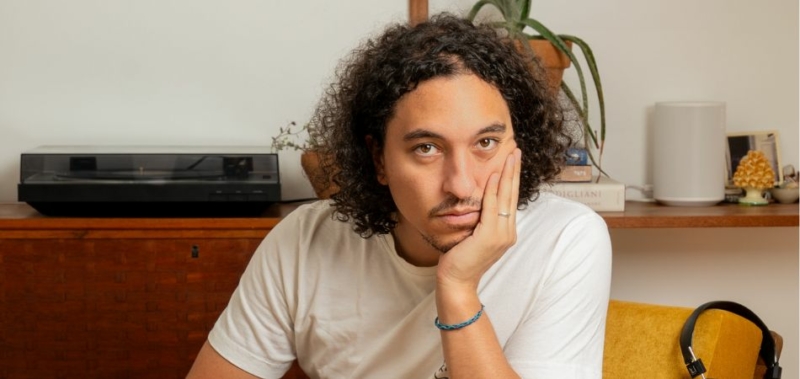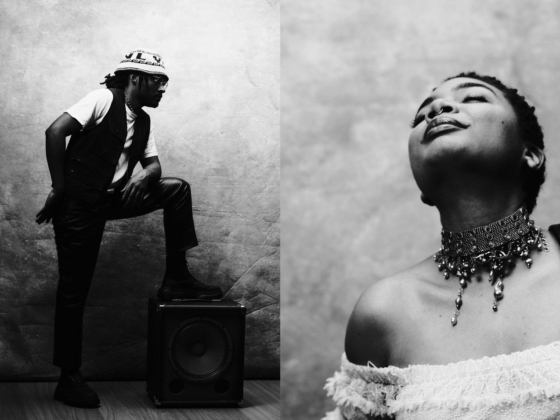As Nina Simone so eloquently put it, “An artist's duty, as far as I'm concerned, is to reflect the times. I think that is true of painters, sculptors, poets, musicians… How can you be an artist and NOT reflect the times? That to me is the definition of an artist.”
Montreal-based artist Boutique Feelings, the project of singer-songwriter, producer, and multi-instrumentalist Karim Lakhdar, embraces this philosophy on his debut album, Shwaya, Shwaya.
The alt hip-hop journey, a follow-up to his self-titled EP, weaves political commentary, societal pressures, and a keen awareness of today’s world—a world hungry for honesty and truth amid political corruption and widespread confusion.
Lakhdar notes that “the genesis of the project stems from a love for Hip-Hop culture, with influences ranging from OutKast and Madlib to Kim Gordon and Gorillaz.”
What better way to speak on things that matter than by using hip-hop as a launchpad—a genre made for the people, by the people—especially when Lakhdar boldly blends jazz, conscious rap flows, old-school hip-hop textures, and dark melodies into something loud, intense, and beautiful.
Boutique Feelings explores the underground of genres, keeping the message, vibe, and aesthetic alive without conforming to a specific structure.
Opening the album is the seven-minute-and-20-second track “Borders,” a journey unto itself.
As the title suggests, “Borders” has no borders—only sections that seamlessly fuse together. It begins with anthemic, stark, sci-fi–like synth chords and a saxophone that dances across the arrangement, commanding the listener’s attention. This leads into a jam session of jazz, echoed vocals, and a sonic build that feels cathartic, though slightly muddy in terms of identifying each separate element.
Around the four-minute mark, a spoken-word-inspired verse emerges, the stark chords return, and the track transitions into a laid-back, jazzy flute section accented by droning electric guitars floating in the distance. It’s an intro that fully immerses the listener in Boutique Feelings’ sonic world.
“Kind to Be Kind” follows, opening with a playful voice memo that transitions into a breakbeat, with the flute returning to the mix. It’s a vibey alt-hip-hop track where the rap flow enters, though it sits slightly behind the instrumental elements. While this may be an intentional choice, the rap flow sometimes struggles to stand out against the other sonic layers.
At the 2:56 mark, a vocal melody enters with the lines, “I couldn’t be the one you wanted. I couldn’t look myself in the mirror,” which meshes beautifully with the building sonic foundation before dropping into a danceable vibe. The bass drives the track, setting a manic, compelling tone.
Skipping to “Long Shore,” the breakbeat grabs you immediately. Sonically, the track feels urgent and timely, calling listeners to pay attention.
Through a non-stop delivery of conscious and reflective lyrics, “Long Shore” questions social media as it increasingly becomes society’s main window to the outside world.
The middle of the album is anchored by three pivotal tracks: “Peace Won’t Keep : Liberation,” “Peace Won’t Keep : Anguish,” and “Peace Won’t Keep : Discernment”—each serving as a layered commentary on the human experience while confidently carving its own lane.
The first track is more minimal; the second, “Peace Won’t Keep : Anguish,” is trip-hop inspired, rugged, and haunting, instantly immersing the listener in a dark, introspective vibe that lingers long after the track ends. The third, “Peace Won’t Keep : Discernment,” features oud-like licks played in tandem with a voice memo addressing police corruption in America and systemic coercion, creating a powerful and thought-provoking statement.
Given the meaning of Shwaya, Shwaya, an Arabic phrase (شوي شوي) that translates to “a little, a little” or “slowly, slowly,” the title evokes the idea of pacing oneself through complex ideas and emotions. It reflects both the gradual unfolding of the album’s sonic landscapes and the thoughtful, nuanced way the music engages with today’s world—perfectly aligning with the pace and themes of Boutique Feelings’ album.
Lakhdar’s work is layered, nonconforming, and deliberate, guiding listeners through political commentary, societal pressures, and introspective moments.
The album unfolds gradually, like a sonic journal revealing hidden truths, drawing the listener into its world. Yet at times, the vocals and rap delivery introduce a sharp contrast that momentarily jars, reminding us of the tension between expression and cohesion—a tension that, while occasionally disruptive, underscores the album’s raw and unfiltered honesty.
Overall, Shwaya, Shwaya is a powerful album with a distinct artistic tone that is undeniably Lakhdar’s, encouraging listeners to absorb each moment, let the melodies, rhythms, and messages reveal themselves, and to question rather than simply accept what they’re fed.
Connect with Boutique Feelings: Instagram | Facebook | Bandcamp









